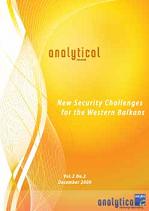POLICE REFORMS IN MACEDONIA ON THE PATH TO EU INTEGRATION
POLICE REFORMS IN MACEDONIA ON THE PATH TO EU INTEGRATION
Author(s): Aleksandar CekovSubject(s): Politics / Political Sciences
Published by: Аналитика Тинк-тенк Организација
Summary/Abstract: Reforming the Police is certainly one of the most challenging tasks that a government can undertake on the path to the EU integration. As the most visible manifestation of the government authority and responsible for maintaining public security; it is one of the most sensitive reform sectors and should be treated with additional care. Therefore, in order to efficiently cope with the challenges of the new threats such as organized crime terrorism etc., the police must adopt a feasible modus operandi in accordance with national and international law, as well as with full respect of human rights. The Reform Process of the Police Sector in Macedonia was initiated parallel with the proclamation of independence, as the country adopted the policy towards democracy and rule of law. Nonetheless, in the period up to 2001 the reforms were mainly directed at establishing democratic institutions and the legal basis for further reforms within the Security Sector more generally. This neglected some important aspects of democratic policing, which later proved to be crucial in the aspiration for NATO and EU integrations. Thus, some of the important changes in this period were in line with promoting parliamentary oversight over the Security Sector. This empowered parliament to approve the Security Sector budget and also promote the concept of a security sector governed by more civilianized bureaucracies. Yet, further developments in democratizing the police were necessary on the path to EU and NATO integrations. In that sense, the intention of this paper is to scrutinize the challenges and the progress made so far in reforming Police along the path for Macedonia’s integration into the EU and thus contribute to the endeavors for more qualitative debate on reform process in order to meet the EU requirements in this field. The paper will start with a historical overview of the process and will continue with an examination of the key norms of police governance. Furthermore the paper will address the objectives of the reform process, the status of the reforms, as well as the challenges of police reform. As close cooperation between the Police structures in the region is required by the EU on the path to integration, this paper will also address the level of cooperation established so far, as well as the potential to deepen this cooperation in order to accelerate the whole process of integration of the region into the EU and NATO structures.
Journal: Analytical
- Issue Year: 2009
- Issue No: 04
- Page Range: 47-56
- Page Count: 10
- Language: English

